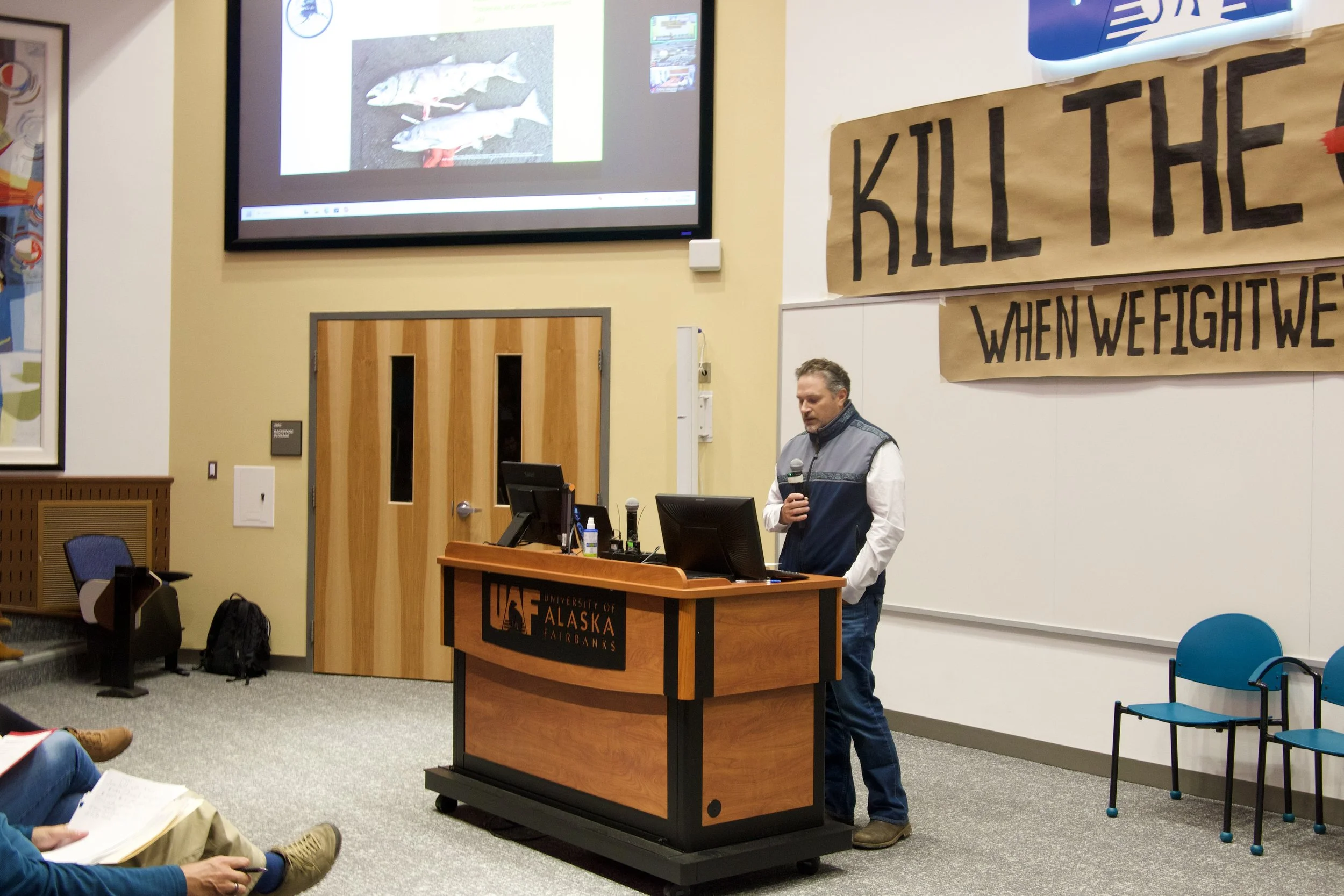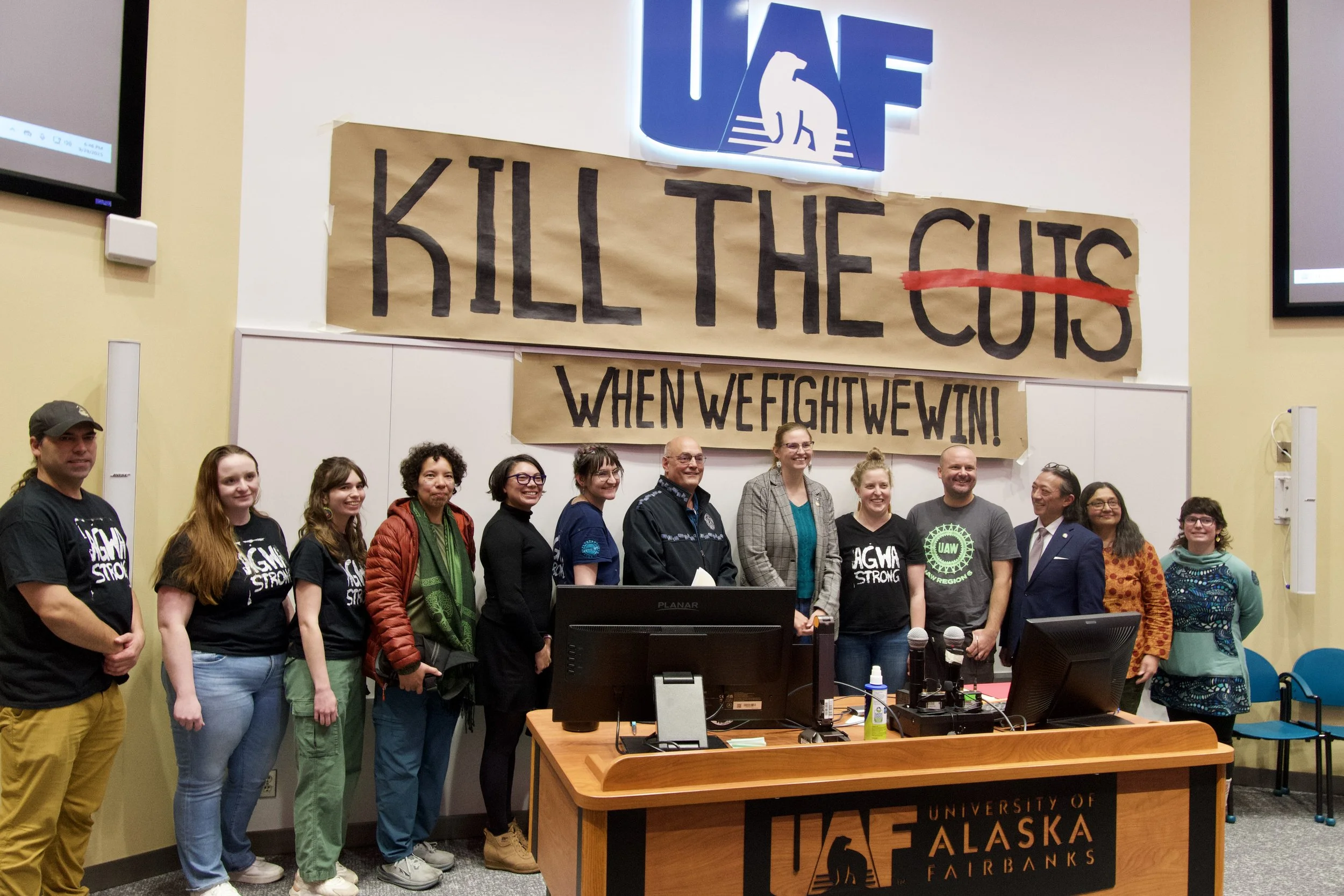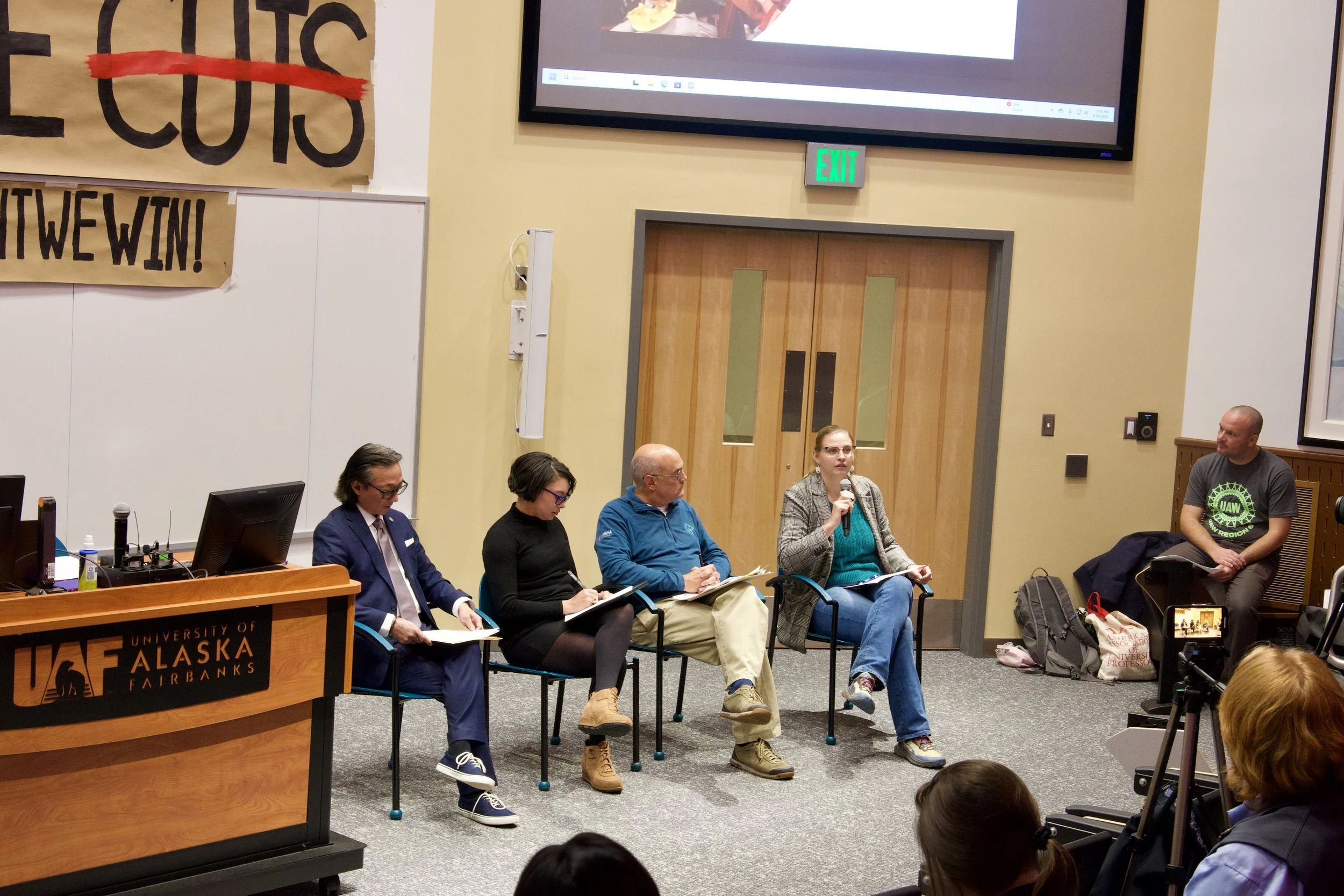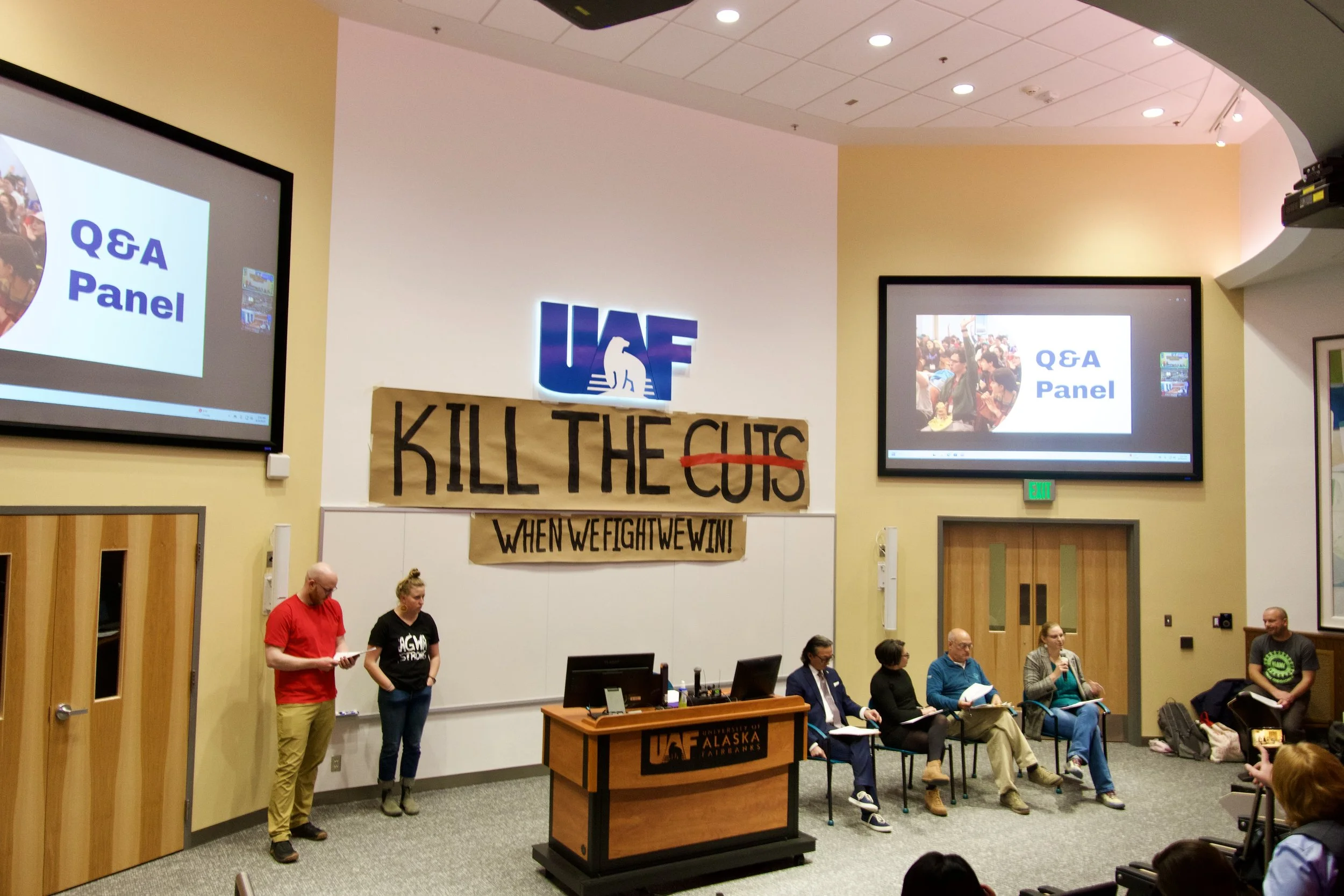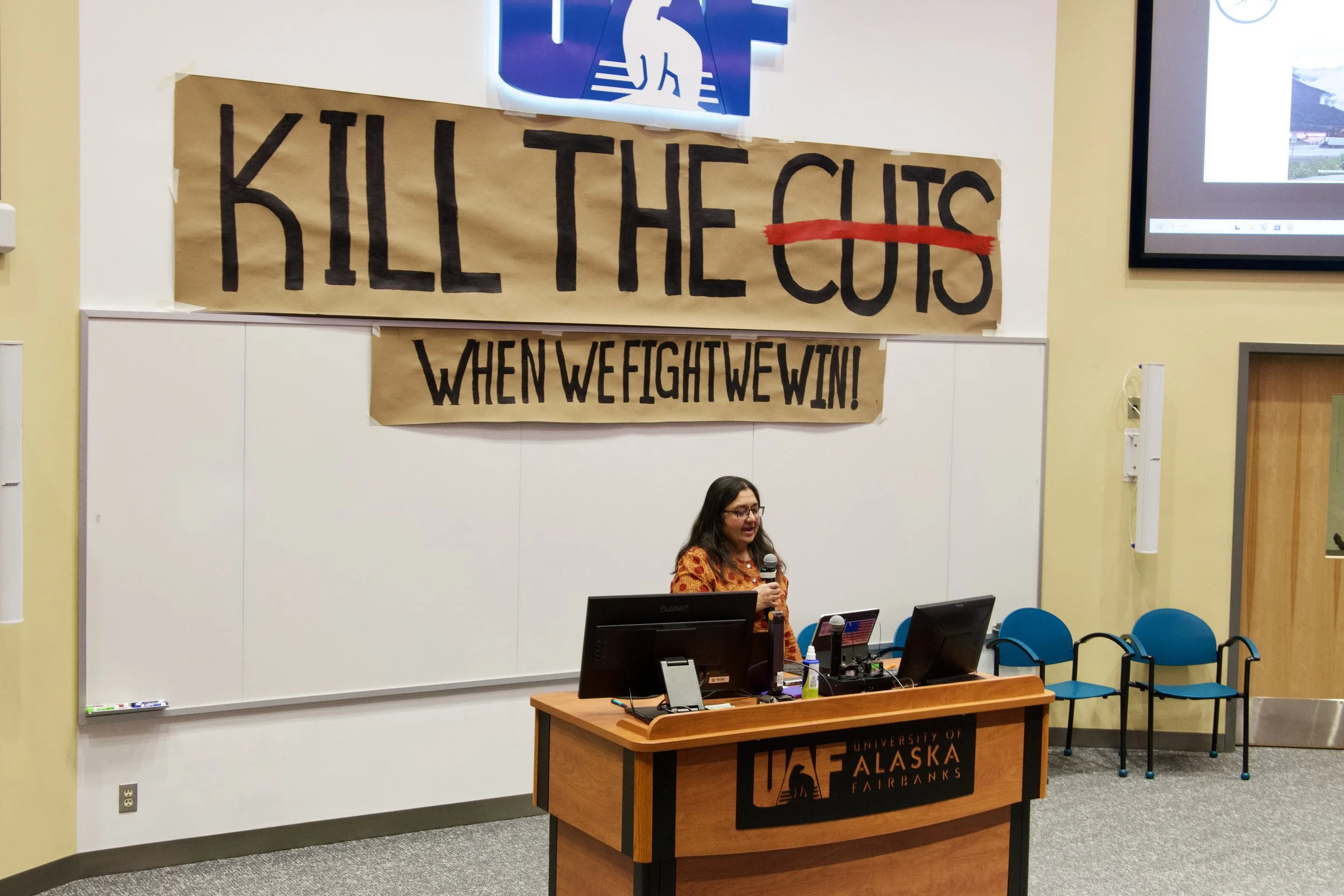UA Graduate Workers Union Hosts “Kill the Cuts” Town Hall
Story and photos by Aaron Thomas
Kyra Bornong delivers opening statements and addresses union members during the September 29 town hall hosted by the Alaskan Graduate Workers Association.
In the wake of federal cuts and divestment from research, the Alaskan Graduate Workers Association, or AGWA, hosted a town hall on September 29 to discuss budget cuts and organize resistance. In attendance were four Alaskan state senators participating in a Q&A panel, the president of AGWA, and numerous union members.
The auditorium was packed with UAF faculty and graduate students. “Union power” and “worker power” chants rang through the auditorium at the start of the event. A large sign at the back of the Schaible Auditorium where the event was held read: “KILL THE CUTS! WHEN WE FIGHT, WE WIN!”
Kyra Bornong, the president of AGWA, addressed the audience and described the cuts as a coordinated attack on research funding in academia. Funding for staff, research facilities, equipment, and government agencies UAF relies on for research is being frozen, redirected, or canceled.
“This war includes blacklisting certain research topics, which results in cuts to work on HIV, AIDS, climate change, vaccines, racial and gender diversity, LGBTQ+ experiences, and more,” Bornong said.
The National Science Foundation is UA’s largest source of funding. The NSF is currently facing a 56% overall cut to their budget. If these proposed cuts are allowed to proceed, Bornong warned that it could be disastrous for Alaskan workers and the economy.
Peter Westley describes the impact of funding cuts to research on Alaska’s Fisheries.
The Trump administration has frozen $45 million dollars of research funding at UAF and $6.6 million has been canceled outright.
Additionally, $8.8 million in Title III funding has been revoked, which will hinder the university’s ability to support rural and native students. In a bipartisan letter to Secretary of Education Linda McMahon, senators from across the nation including Alaskan senators Lisa Murkowski and Dan Sullivan urged against cutting Title III funding.
Specifically, two grant programs funded under Title III, Strengthening Alaskan Native and Native Hawaiian Serving Institutions (ANNHSI) and Strengthening Native American Non-Tribal Institutions (NASNTI), were cut.
After the opening introductions, several UAF researchers and union members described how budget cuts would affect their particular area of research.
Zach Vayder, a marine biology masters student at UAF who specializes in studying mussels in Alaska described how his work is made possible by federal funding. Mussels are a common source of food in coastal communities in Alaska and according to a 2013 study on tribes residing in the Cook Inlet region, over 40% of people in these communities consumed mussels for subsistence. Vayder’s research is funded largely by the NOAA which also has suffered substantial funding cuts.
Alaskan state senators stand alongside union members and UAF faculty.
“This past summer, I talked with many locals near Seldovia, and I kept getting the same question: where do they go? And they all seemed to remember these mussel beds being much bigger and denser decades ago,” Vayder said. While there are many theories as to where they have gone including sea otter predation, algal blooms, overharvesting, and disease, further research is needed to determine a definite cause.
Without access to funding, research into the dwindling population of mussels is being cut at a critical time where warming oceans and overharvesting threaten mussel populations and place strain on the communities that rely on them.
Kara Kornhauser, the Experiential Education Program Coordinator for Inspiring Girls Expeditions Alaska, described how cuts to funding have impacted the non-profit organization. Inspiring Girls Expeditions focuses on getting girls interested in STEM and funding guided expeditions in the wilderness.
Alaskan state senators Scott Kawasaki, Loki Tobin, Andy Josephson, and Ashley Carrick take questions from union leaders.
“73% of our alumni who pursued higher education believe their expedition influenced their area of study, with half of them choosing STEM fields after their expeditions,” said Kornhauser.
Peter Westley, a Fisheries and Ocean Sciences professor, described how budget cuts will affect research into Alaska’s salmon fisheries. Salmon have sustained populations living on the Yukon river for more than 11,000 years, but for the past five years king and chum salmon runs have performed so poorly the fisheries have been closed to subsistence harvesters.
According to Westley, an NSF grant that was funding one of his projects was cut under the pretense that working with Alaska's tribes to study fish populations falls under the umbrella of “diversity, equity, and inclusion.” Westley urged legislators that funding cuts could be disastrous for Alaska’s fisheries as they are pushed to a breaking point.
“We cannot meet this crisis that requires our full capacity with less. Doing so is nothing less than letting king salmon and the cultures tied to them continue to slip towards extinction,” Westley said.
Melina Arceneaga, a graduate researcher in anthropology, described her research in human water relationships. In Fairbanks, a large number of residents live without access to running water in dry cabins. While some prefer this lifestyle, living without access to running water is an economic necessity for many in the community. Her research pursues questions regarding how peoples’ access to water is affected by health, age, and access to transportation. Her research is currently being canceled by the USGS for being too “community specific.” All of the funding from the USGS to the water and environmental research center was also frozen.
Alaska state senators Scott Kawasaki, Loki Tobin, Andy Josephson, and Ashley Carrick address the crowd.
Nawal O’Keef, a Ph.D. student in Oceanography at UAF, spoke on her research on ice berms along the Chukchi Sea and the coast of Utqiagvik. Ice berms are a natural phenomenon where sea ice forms a ridge that protects against coastal erosion and storm surges. With changes in sea ice coverage and intrusions of warm water from the Atlantic ocean leading to rapid coastal erosion, communities on Alaska’s northern coasts are in a vulnerable position. Her research heavily relies on NOAA data for wind speed and direction, air temperature, and barometric pressure to study ice berms and coastal erosion.
O’Keef ended her speech with comments on how broader government shifts in funding are not only harmful in Alaska, but people across the world. She described the diversion of critical research funding that focuses on resilience being diverted to fund war abroad instead of being invested in communities in the Arctic. She stressed that by deprioritizing research and science, communities are being left unprepared as they approach environmental catastrophe.
“I want to emphasize that cutting research and community funds to fuel war abroad and fund the genocide of Palestinians is not only unconscionable, but is actively hurting our own communities,” O’Keef said.
Uma Bhatt explains her research on wildfire forecasting.
Uma Bhatt, department chair of atmospheric sciences, spoke about how wildfire forecasting will be affected by proposed budget cuts. Her research is heavily reliant on NOAA and NSF funding which are facing cuts.
“This work in Alaska will stop and will not come back, and it cannot be picked up by somebody else. This research stops, the training stops, and Alaskans are left more vulnerable. And we know fire activity is increasing,” Bhatt said.
In a Q&A segment of the event, state senators Scott Kawasaki, Loki Tobin, Andy Josephson, and Ashley Carrick fielded questions from the union leadership regarding the landscape of federal and state funding for the broader UA system.
The questions ranged from how workers and the state should collaborate to combat brain drain and labor shortages in critical industries, how research funding can grow alongside increasing defense spending in Alaska, and how the state legislature is able to cooperate with the governor's office and the federal government.
While the senators stressed that the situation is dire, Senator Josephson emphasized that change is possible through cooperation. He stated that they were able to get $10 million in behavioral health grant increases, $3 million in funding for senior centers, $5.5 million for child advocacy centers, and $174 million permanently for public school education despite being told by the broader state senate that they would not happen.
As the event came to a close, union leadership stood alongside the four Alaskan senators for a photo and audience members came down to the stage to ask additional questions.
AGWA can be reached at organize.agwa@gmail.com.
Correction: This story previously stated that Melina Arceneaga’s funding came through the NSF, it actually comes from the USGS. Another correction was made to reflect that all of the funding from the USGS to the water and environmental research center was also frozen.



